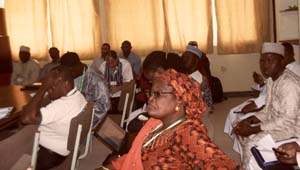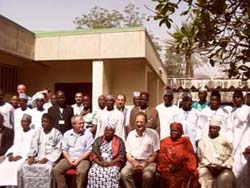March 7 2014 was a memorable date for IITA Kano station and Nigeria legume farmers. N2Africa Phase II was launched in Kano city. The benefit of Phase I of the project were; farmers are convinced about yield enhancement effect the use of rhizobium inoculant in soya bean production in Nigeria and are ready to adopt the practice as a practicable way of generating more income. Luckily, Nigeria has been designated as one of the core countries in Phase II.
Director General of IITA ably represented by Dr Bernard Vanlauwe launched the Phase II project in the campus of IITA Kano station. Major stakeholders and key players in the N2Africa Phase I participated in the launching. In his presentation entitle Overview of N2Africa Phase II, Prof. Ken Giller introduced the project strategy.
Dr Bernard Vanlauwe, IITA Director R4D for Central Africa and NRM spoke on the implementation strategy for N2Africa in Nigeria.
According to Dr Bernard, N2Africa vision of success is to build sustainable, long-term partnerships to enable smallholder farmers to benefit from symbiotic N2-fixation by grain legumes through effective production technologies including inoculants and fertilizers. He stressed that the Phase II exit strategy will build national capacity to sustain the benefit of rhizobium inoculant in legume production and value addition as N2Africa in Nigeria works through partners and linking with national and international initiatives which are clearly embedded in the national system, N2Africa leverages a position to ensure sustainability of the project.
 |
 |
As part of the activity after the launching the house broke into 6 working groups to develop sub-activities to be carried out by various partners. The N2Africa team in Nigeria also mapped our strategy for immediate take-off of the project pending when master work-plan from the central project office is ready. Specific responsibility were also assigned to individual team member and the Country coordinator want to ensure that the distribution of materials such as seed and inoculant for demo plots and agronomy research are delivered to project partners before the start of planting season in all selected site.
Emmanuel Sangodele
